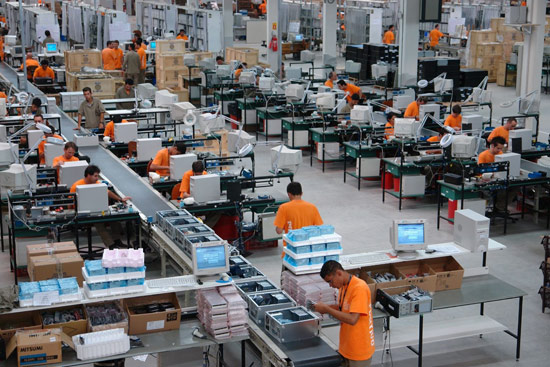Offshore production may enhance, not hurt, US employment: analysis

When jobs leave these shores, it's a bad thing, right? Some researchers recently looked at Apple's value chain and concluded that offshore production may often increase prospects for better, more high-value jobs within North America.

On its surface, the act of sending production overseas looks like job opportunities are being taken away from domestic workers, and money being sucked out of the domestic economy. However, an article in the latest issue of the Journal of International Commerce and Economics, published by the US International Trade Commission, suggests that in practice, higher-paying jobs in the value chain tend to stay on US shores.
Greg Linden, Jason Dedrick and Kenneth L. Kraemer looked at Apple's iPod value chain, and conclude that the company's deployment of overseas production enhanced the company's overall capability to support a higher-paid domestic workforce:
"To shed light on the jobs issue, we analyze the iPod, which is manufactured offshore using mostly foreign-made components. In terms of headcount, we estimate that, in 2006, the iPod supported nearly twice as many jobs offshore as in the United States. Yet the total wages paid in the United States amounted to more than twice as much as those paid overseas. Driving this result is the fact that Apple keeps most of its research and development (R&D) and corporate support functions in the United States, providing thousands of high-paid professional and engineering jobs that can be attributed to the success of the iPod. This case provides evidence that innovation by a U.S. company at the head of a global value chain can benefit both the company and U.S. workers."
Okay, that was 2006, but has this base of high-value jobs eroded since then? The researchers say no, and that while Apple is now heavily into iPhone and iPad production, the scenario still holds today, they insist.
The authors also calculate that "the total wages paid to the US workers are more than double those paid overseas." As of 2006, the year studied, Apple had 27,000 workers overseas and 14,000 within the United States. While about two-thirds of Apple workers were in Asia, close to three-quarters of salaries went to US-based workers. "Workers received over $1 billion in earnings from iPod-related jobs in 2006, or about $25 per unit sold. Of this total, nearly $750 million went to U.S. workers and about $320 million, less than half as much, to workers outside the United States."
The authors add that many of the US-based jobs were professional jobs: "Over two-thirds ($525 million) of the earnings in the United States went to professional workers, and an additional $220 million to nonprofessional workers."
The study's authors conclude that "the relationship between innovation by US companies and employment in the United States is more complex than phrases such as the 'vanishing middle class' suggest. When innovative products are designed and marketed by US companies, they can create valuable jobs for American workers even if the products are manufactured offshore."
Apple’s success with the iPod -- and by extension, presumably, iPhones and iPads -- have driven growth in US employment, "even though these products are made offshore," the authors add. In addition, the jobs generated at the high end of this global value chain tend to be higher-paying professional jobs, while lower-end production jobs tend to be extremely tenuous, moving to the lowest-cost offshore sites.
Another macro-economic point, not raised in the article: when North American companies build up overseas, they help create vast new markets for their goods. Helping the Chinese economy, for example, is creating a vast market for tech devices such as iPhones.
This is not a call to get complacent, however, the authors also caution. US-based companies need to maintain their edges in innovation with game-changing products. Firms in other nations may also keep their high-level jobs within their boundaries. "Offshore jobs often support high-value jobs in the United States, but this may not always be the case," the researchers warn.
This post was originally published on Smartplanet.com